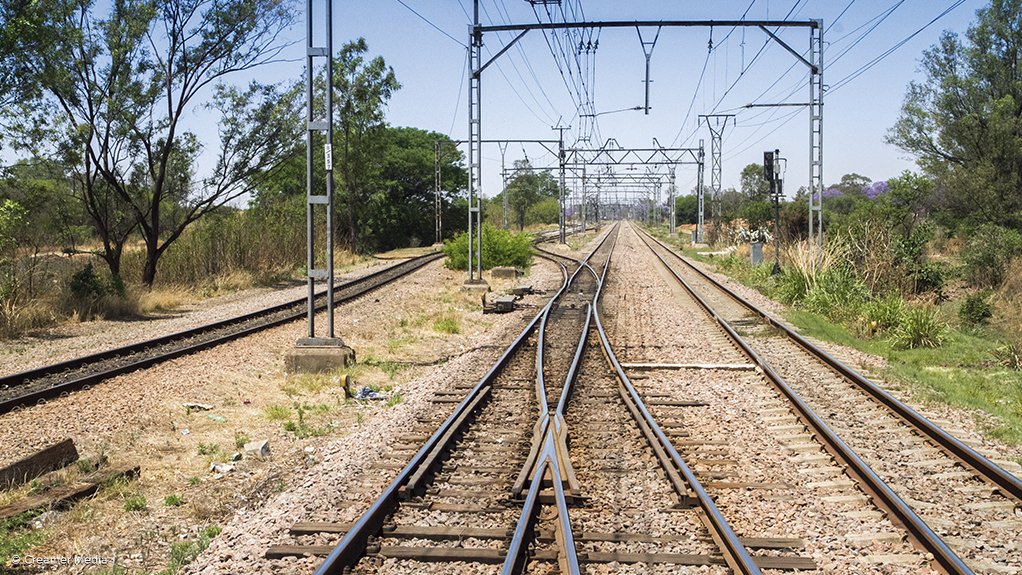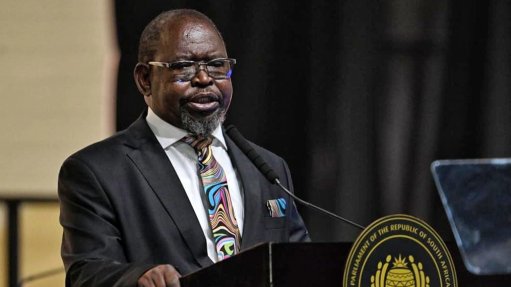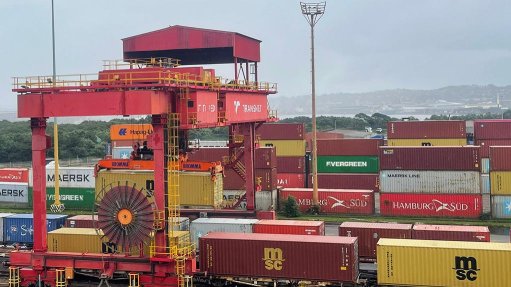Transport Forum discusses embedding crucial reforms by demonstrating their impact
The virtual conference held by transport sector engagement organisation the Transport Forum on November 6 heard from a range of experts about the progress of reforms in the transport sector and the improvements in logistics over the past few years.
The conference also discussed how gathering data on the performance improvements and the direct benefits from the reforms for businesses and people, and publicising this data, could help to embed the reforms within the political environment in South Africa.
Advisory firm Eunomix CEO Claude de Baissac opened the discussions by saying that South Africa had brought itself back from the brink of collapse over the past few years, but that risks to this progress remained.
“As I have said to government and business leaders, South Africa is good at avoiding the worst-case scenarios, but has not been successful at crafting a long-term path to sustainable and inclusive economic growth,” he said.
Most of the reforms undertaken were owing to network industries reform initiative Operation Vulindlela, which resided within the Presidency. This means that, when political power changes, there is a risk that the reform initiatives may not continue.
South Africa had been doing moderately well from 2005 to 2007, but this was while the State capture project was manifesting itself, De Baissac said.
All the initiatives and policies built up during former President Thabo Mbeki’s era through great effort were quickly undone in the years thereafter, he pointed out.
“The conversations I have been having with the CEOs of [State-owned] Transnet and Eskom have been around when do we reach a point of reform where what has been achieved cannot be undone by who comes next, if they wanted to undo this work,” he said.
“We need to be alive to the fact that State capture is possible again and that it can happen very quickly and easily. Nothing currently prevents Transnet from being captured again. Its board of directors and CEO can be changed, and it can be done within 24 hours.
“True reform has to pass through the gate of reforming the public sector so that the entity cannot be captured again, or that it is at least difficult to do so,” he added.
This was because reforms were about changing the roles and responsibilities of various economic activities, meaning that reform was about changing the way the system worked.
However, separating Eskom and Transnet into infrastructure and operating companies and opening the electricity market and railways to competition were narrow reforms and the big reforms had not happened yet.
“As long as the economy depends in critical ways on parastatals that are governed by government, if that government is corrupt or intends to undo prior reforms, then it will do so and faster than we may think.”
South Africa had an opportunity now under the Government of National Unity to push hard for profound reforms on who owns and operates key logistics, energy and water assets of the country.
Telkom, which was previously State-owned, was a prime example of how a network industry that was reformed and opened to competition meant that the sector continued to function without being implicated in State capture.
“This position [where no critical elements of the economy depend on State organisations] is where we need to get the rest of the critical elements in the economy. One of the ways is to create a unified set of public sector reforms, such as that no entity will be subsidised without a clear contract for each one's responsibilities, accountability and transparency,” he said.
Meanwhile, infrastructure development advisory firm Krida Group director and National Logistics Crisis Committee (NLCC) member Krish Reddy told attendees that the reforms in the sector were aimed at restoring freight capacity, attracting private capital and improving efficiency.
“In the reform space, we need to show the benefits to the larger population, which needs inclusive growth and to see the benefits of reform in the form of job creation and social upliftment.
“If we can demonstrate that, then we can get onto a path from which we cannot return to State capture,” he said.
The NLCC had found that the inefficiencies and high costs in the South African rail network were caused by a historic under-investment in maintenance, as well as inadequate funding and diversion of resources to support operations rather than invest in economic infrastructure.
There were also questions about the suitability of public procurement mechanisms to drive an organisation like Transnet, he added.
The challenge was that South Africa had to invest into a space that had faced challenges.
The current structure was reliant on Transnet's balance sheet, which did not allow it to deal with many of the matters, which meant that private sector investment in the network was critical, said Reddy.
“Beyond these technical challenges, there are deep-rooted issues, namely issues of governance and State capture, and how we can put proper checks and balances in place to avoid this.”
Additionally, the unfunded mandate of Transnet, namely its development mandate compared with its commercial mandate, had been a challenge to the organisation.
There had been inadequate oversight of its development mandate and the under-investment in the economic infrastructure, with funding more focused on generating operating profits, he noted.
However, there had been initiatives to bring about these needed reforms. After the Freight Logistics Roadmap was adopted in December 2023, significant work had been done and lots achieved over the past two years, Reddy noted.
From a governance perspective, there had been new coordination and a regulatory framework established under a Transport Regulator, which had been resourced at a board level.
Then, South Africa was also looking into establishing a National Ports Authority and a Rail Infrastructure Manager to be independent decision-making bodies that were not part of the broader Transnet body.
The country was also opening up its railways to private operators, and the process of establishing a leasing company for surplus rolling stock was well progressed, he added.
“On the ports side, we are looking at concessioning of the port terminal space, and are looking for operating partners and public-private partners.
“On the investment side, we are also looking at concessioning and, through the Department of Transport's Public Sector Participation Unit, there is a programmatic approach on each corridor looking for requests for information, with the aim to eventually invite private participation on the corridors.”
As South Africa passed each pillar of reform, it was making progress, although not yet where these reforms were entrenched in the economy, said Reddy.
Meanwhile, as part of moves to entrench reforms, consulting firm Krila Consulting Services business executive Brenda Magqwaka provided a detailed look at the newly established industry organisation nonprofit the Container User Forum (CUF).
This was an industry-led initiative that aimed to transform container logistics in South Africa through collaboration. Specifically, it was constituted from all relevant stakeholders, including shipping lines, terminals, cargo owners and technology providers.
Importantly, the forum provided space for any stakeholder in the container sector to engage, and acted as a neutral delivery hub for container sector initiatives across these various stakeholders, she said.
Additionally, the CUF aimed to complement existing bodies and industry associations, which served as the sectional voices for forwarders, shipping agents, truckers and inland ports. CUF aimed to convene cross-industry interests to implement system-wide solutions, Magqwaka said.
“Transnet Port Terminals (TPT) has consistently handled on average 90 000 twenty-foot equivalent units (TEUs) a week since June and achieved a 7.2% increase in September to reach 103 000 TEUs handled in a week, which was approaching historic highs.
“TPT CE Jabu Mdaki said the milestone was the direct result of unprecedented collaboration between TPT, labour partners, shipping lines, cargo owners and logistics stakeholders,” she pointed out.
“Without institutionalising this model, today's gains may prove short-lived. The CUF provides the structure to capture this momentum and prevent a reversion to fragmented approaches,” she said.
In concluding the event, De Baissac praised the work of Magqwaka and the CUF as an example of how to institutionalise reforms, including with the performance metrics for all the separate board and member teams tackling different issues facing the container logistics sector.
“This type of work is needed, as it is highly structured and involves many stakeholders, with associated performance metrics for participants, which will lead to strong entrenchment of reforms in the sector because they will demonstrate the results.
“This process of involving all stakeholders and driving outcomes also takes ownership of the processes and outcomes, and takes it away from those who may have ulterior agendas. Thereby, it will be difficult to go against these reforms and embed them in the economy,” he said.
Article Enquiry
Email Article
Save Article
Feedback
To advertise email advertising@creamermedia.co.za or click here
Press Office
Announcements
What's On
Subscribe to improve your user experience...
Option 1 (equivalent of R125 a month):
Receive a weekly copy of Creamer Media's Engineering News & Mining Weekly magazine
(print copy for those in South Africa and e-magazine for those outside of South Africa)
Receive daily email newsletters
Access to full search results
Access archive of magazine back copies
Access to Projects in Progress
Access to ONE Research Report of your choice in PDF format
Option 2 (equivalent of R375 a month):
All benefits from Option 1
PLUS
Access to Creamer Media's Research Channel Africa for ALL Research Reports, in PDF format, on various industrial and mining sectors
including Electricity; Water; Energy Transition; Hydrogen; Roads, Rail and Ports; Coal; Gold; Platinum; Battery Metals; etc.
Already a subscriber?
Forgotten your password?
Receive weekly copy of Creamer Media's Engineering News & Mining Weekly magazine (print copy for those in South Africa and e-magazine for those outside of South Africa)
➕
Recieve daily email newsletters
➕
Access to full search results
➕
Access archive of magazine back copies
➕
Access to Projects in Progress
➕
Access to ONE Research Report of your choice in PDF format
RESEARCH CHANNEL AFRICA
R4500 (equivalent of R375 a month)
SUBSCRIBEAll benefits from Option 1
➕
Access to Creamer Media's Research Channel Africa for ALL Research Reports on various industrial and mining sectors, in PDF format, including on:
Electricity
➕
Water
➕
Energy Transition
➕
Hydrogen
➕
Roads, Rail and Ports
➕
Coal
➕
Gold
➕
Platinum
➕
Battery Metals
➕
etc.
Receive all benefits from Option 1 or Option 2 delivered to numerous people at your company
➕
Multiple User names and Passwords for simultaneous log-ins
➕
Intranet integration access to all in your organisation




















